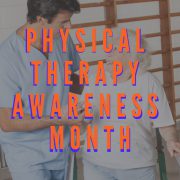The Power of Physical Therapy
In honor of physical therapy month, we at Ustep want to celebrate our important partners in bringing patients and customers increased mobility and motor function: physical therapists.
We live in an “instant gratification” society. So much of what we want to buy/see/do is available with the click of a button. Physical therapy is not a quick fix or a magic pill; it doesn’t work instantaneously. But for many, it has the power to change one’s life in a deep and lasting way.
Medication is often a quick way to get you to the finish line of temporary pain relief. But while reducing or eliminating pain (temporarily), medicine cannot return functionality to injured bones and muscles. It cannot help us regain strength that we have lost and it cannot help us achieve enough mobility to return not just “feel better” but be healthier.
Physical therapy is one of the most important things a person with a condition or injury can do for themselves. What is the power behind this practice?
Medication Prevention
As we alluded to above, physical therapy is the best long-term alternative to drugs when it comes to improved mobility and pain management (without all of the nasty side effects like potential addiction, masking the true source of the pain, liver damage, and more). Learning how to use your body correctly and rehabilitate is the BEST way to work towards a mobile, and opioid-free life.
Understanding the Root Cause of Your Pain
Working out your pain source and how to fix it is one of the key objectives of physical therapy. Rather than only treating symptoms, your physical therapist is invested in finding out why your body is hurting you and in working with you to adjust to your condition’s limiting of your capabilities and/or movements, rehabilitate from an injury, and/or strengthen your weakening body.
Self-Empowerment
When we come to a place where we begin to understand the root of our weakness or pain, we can work together with the physical therapist to improve our bodies over time. If you do your exercises consistently you will eventually see improvement and gain strength.
Preventing Surgery
When you continually use your body incorrectly or mask your pain with medication your body will not improve and surgery may be in your future. A physical therapist can get to the root cause of your mobility issue and potentially avoid surgery.
Fall Prevention
As you get older you become more prone to falling, a leading cause of death among the elderly. 40% of the elderly who fall do not return to independent living afterward and 25% die within one year of falling. And once you fall, you dramatically increase your chances of falling again. It used to be common to prescribe extra calcium and vitamin D so that elderly bones are strengthened and can sustain a fall, but now there is a strong focus on exercise and working on balance. If you have been feeling a wobble in your step, work on your mobility and balance as soon as possible with a physical therapist. Your life could depend on it.
Recovery
Yes, recovery. We cannot promise you that in your specific circumstance that you will come to a complete recovery, especially if you have been diagnosed with a neurological disease in which case PT provides excellent prevention and strength as your disease progresses. However, of all the treatment options out there, physical therapy is the only one that has the potential to help you regain lost capabilities. This is a long process and takes a lot of commitment and work on your part, but the dream of a mobile life is highly possible and your physical therapist is there to partner with you on your journey.
Recommendations for mobility aids
The expertise and knowledge that physical therapists have is instrumental in patients finding and purchasing the right mobility aid. Physical therapists see devices such as canes and walkers as powerful alternatives to wheelchairs, as it keeps patients up and moving. We work together as a team to keep you (or your loved one) up, moving, and ideally as independent as possible.
If you are currently undergoing physical therapy, talk to your physical therapist about the walking aids that are available. Use their vast knowledge to make sure that whichever products you own remain the best choice for you, and of course, make sure to acknowledge their efforts and all that they are doing for you.








Leave a Reply
Want to join the discussion?Feel free to contribute!